 Menu
Menu
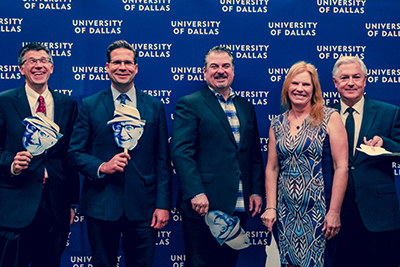
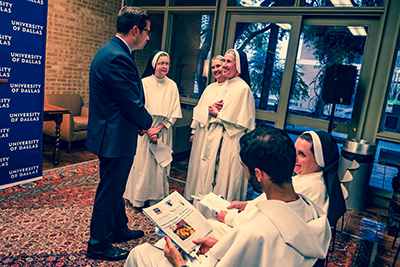
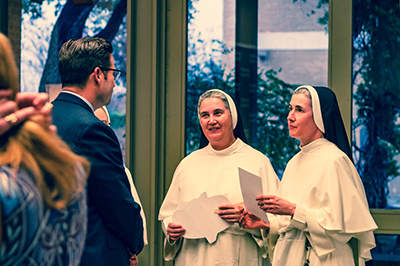
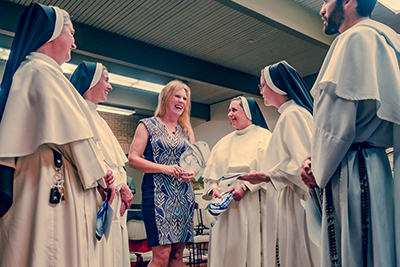
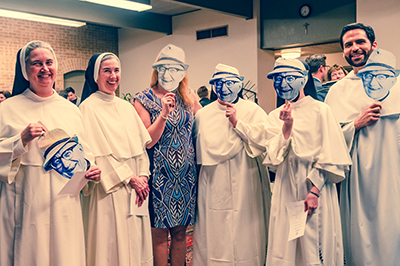
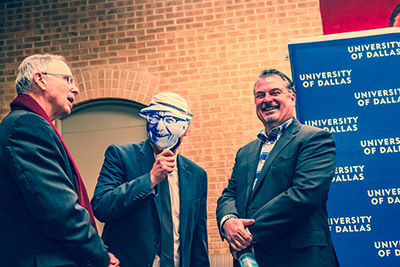
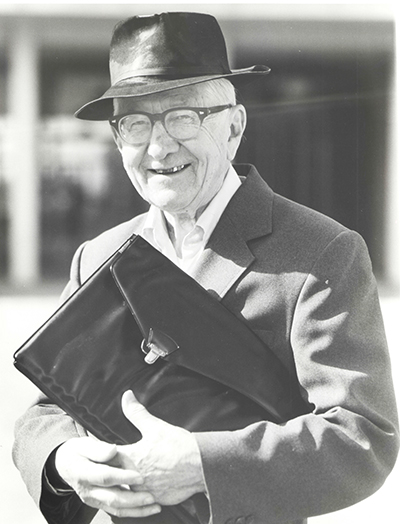
On Wednesday, Feb. 19, members of the university community gathered to celebrate the endowment of the Father Thomas Matthias Cain, O.P., Memorial Scholarship in Philosophy by Trustee Annmarie (Flynn) Kelly, BA ’91, and her husband, Robert (Bob) Kelly, MA ’92 PhD ’95. This scholarship will support philosophy majors at the University of Dallas.
“Father Cain was here when I was here,” said President Thomas S. Hibbs, Ph.D., BA ’82 MA ’83. “I didn't have him in class, but he was an unavoidable presence on campus and a smart, genial, warm person.”
Hibbs recounted what had been shared with him by Yasmin Gupta, MBA ’82, one of the namesakes of the Satish & Yasmin Gupta College of Business, who was unable to attend the ceremony: Although she was a graduate business student in what was then the Graduate School of Management, she worked as a secretary in the Philosophy Department, and Father Cain was one of her favorite people on campus.
“She was thrilled to hear that this had come to be, as we all are,” said Hibbs.
“It’s just wonderful to have both of you here on campus,” added Hibbs, addressing the Kellys. “And we're very grateful for your generosity. This is a way to support, obviously, and to help make it more affordable for students to come to the University of Dallas. But to do so in a way that honors a faculty member is, I think, doubly significant and sacrificial on your part. It's honoring our heritage; it's honoring a legendary faculty member. It's also something that will make it easier for us to ask other people to give, because it's named for a faculty member whose impact has been so widespread.”
Provost and Professor of Philosophy Jonathan J. Sanford, Ph.D., shared some of what he has been told about Father Cain, though he never knew him.
“As President Hibbs pointed out, he was known for his great wit and his sense of humor, and apparently had a real knack for limericks and would produce them on the spot,” said Sanford. “He had a skateboarding frog that he would make reference to in class and several other stock examples.”
However, what truly struck Sanford as he read through the materials on Father Cain provided by the University Archives is that while studying at the University of Freiberg in Germany during World War II, Father Cain had to flee when they learned the Nazis were coming. He went to the Philippines, where he received his advanced degrees at the University of St. Thomas. Just after he finished his doctorate in philosophy, he was captured by the Japanese and put in an internment camp nicknamed “Hell Camp” due to the scarcity of food and level of work. Several bishops and other priests were interred in the same camp, and many people died there.
“This man for more than a year was in a terrible set of circumstances and yet was known to be such a lighthearted philosopher priest,” said Sanford. “And I will submit that those two go together quite well.”
“Father Cain had a very capacious view of philosophy: philosophy is a way of living and a way of being prepared for death,” explained Sanford. “As Plato submits, readiness to die has a profound effect on how you live. So one can live in a lighthearted fashion even, because of this preparation for death.”
According to Father Cain himself in his memories of the internment camp, “I would celebrate the Eucharist with a particle the size of my little fingernail, and we would give the crumbs to the people. We made wine out of raisins by soaking them in water.”
“So this is him in that camp finding a way to communicate the gift that he'd received by his ordination and to share Christ with others,” said Sanford.
There is a courtyard on campus near the Drama Building dedicated to Father Cain. Upon its dedication, the late Professor of English Eugene Curtsinger, Ph.D., said, “You all know him, the beautiful old Dominican who has been here almost forever. And who, more than anyone else, it seems to me, is the university's walking embodiment of the atmosphere — strict, loving, joyful, even playful — in which alone, because of the nature of the truth, we are committed to real teaching, and real learning can occur.”
“I want to thank the Kellys,” concluded Sanford. “A, for making philosophical education possible for more students at the University of Dallas, and B, for bringing to mind again the life and legacy of Father Cain.”
In his remarks, Associate Professor and Chair of Philosophy Chad Engelland, Ph.D., dispelled a common misperception about the philosophy major. He said, “No one should major in something impractical; philosophy is impractical. Therefore, no one should major in it. So powerful is this argument that parents and family members who are otherwise laissez faire and relativistic about a whole lot of what a young person does will become positively absolutist when it comes to prohibiting any loved one from majoring in the love of wisdom.”
As it turns out, though, philosophy is not impractical.
“Philosophy majors earn more through all stages of their careers than any other humanities major besides politics,” said Engelland. “And they outperform everyone on the GRE, almost everyone on the LSAT, and most everybody on the GMAT. But stats are stats, and what moves the human heart is testimony.
Therefore, Engelland cited several testimonies from alumni as evidence of the practicality of philosophy.
According to an alumnus lawyer, "The focus on logic and clarity makes a huge difference in one's writing. Without that emphasis, I would never have succeeded in law school."
Meanwhile, an alumnus doctor wrote, "Philosophy allows access, answers and insights to life's biggest questions. The big questions are big not only because they're important, but also because they're found everywhere and affect everything. I don't know how laymen or medical professionals navigate the issues of life and death, health and disease, happiness and wholeness without a background in philosophy."
Further, an alumnus state representative from Pennsylvania said, "Philosophy gives you circumspection, or perhaps more accurately, an appreciation for the need to be circumspect in the way you approach questions. Getting to the heart of a matter and then seeing it from all sides continues to help me see beauty and pursue the good."
Finally, an alumnus business leader wrote, "My degree in philosophy helped hone my critical thinking skills, which is a crucial element of success in today's changing world. The required readings and all of the writing instilled in me the ability to see a new problem and use past experiences and past learning to determine a solution. It taught me to think, or at least reinforced that I knew how to think and refine my thinking process. This has played out throughout my career."
“Such is the true nature of philosophy,” said Engelland. “Now, how did our graduates discover it? Well, it was thanks to teachers like Father Thomas Cain, who peeled back the layers of contemporary prejudice to expose students to the life-changing, practical benefits of being thoughtful.”
From Father Cain’s frog purse in which he kept a seemingly endless supply of candy and other treats and the skateboarding rabbit that would sometimes argue with this frog, to the limericks he would compose and distribute to his colleagues to be enjoyed during the annual commencement ceremony and his rousing renditions of “Waltzing Matilda,” “‘Be of good cheer’ seems to have been the substance of his teaching,” said Engelland.
“A philosophy scholarship helps alert parents that the philosophy major is not as impractical as it may seem at first glance,” said Engelland. “When the students arrive on campus and enroll in their courses, they'll discover firsthand that philosophy unlocks a host of practical possibilities in time. Their parents will discover the same. On behalf of all of its future recipients, I'd like to thank our donors, Bob and Annmarie Kelly, for making the study of philosophy more accessible.”
“I love this place,” said Annmarie Kelly. “We were just in the Cappuccino Bar to get coffee before coming over here, and it's pretty full of students … and I overheard one say, ‘Well, that's the primary function of the soul’ — which is not something you get to hear all the time.”
“One of the many joys of life at UD when I was a student was running into Father Cain,” she went on. “He would give me some contraband gum or raisins or a joke on the Mall. Once he even gave me a nicely tailored, long gray men's dress shirt. I don't know why, and I still have it. But the best gift he gave me was his modeling of joy. I know Father Cain's intelligence was profound, and his life's sufferings were profound as well. But the aspect he chose to project to all of us was that of joy. He was fiercely, persistently joyful.”
“He wasn't naïve or cavalier about life, but he took the risk of seeming that way so that he could spread joy and love and hope continuously,” said added. “And this was despite his tortured history of surviving the infamous 70-mile-long Bataan death march in the high heat of the Philippines in World War II — which I was once told he survived weighing less than 90 pounds. So Father Cain had every right to be hateful and bitter. And instead, he stands out as one of those fiercely joyful people.”
Bob Kelly, meanwhile, recalled his time at UD as a graduate student, when he spent more time on campus than other graduate students because he was dating his future wife, an undergraduate at the time, and also had a proclivity for playing Frisbee golf on the Mall.
“Father Cain would come along with his frog; that thing was crazy,” said Bob Kelly. “It was just a frog filled with whatever little trinkets and candy; it just was endless. And he was always talking to you with it. And that sense of joy and happiness and bounty was something that I always will remember and always have remembered about Father Cain. And it reminded me so much about what a university like UD is. You obviously have the rigor of the program. Each of the students, undergrad or graduate, works really hard. The faculty worked really hard to provide the environment. But at the end of the day, this is a community, and it's a community of like-minded people who have a really hard job to go do. But the other side of that community is sort of that sense of life, that sense of real living. And Father Cain was that.”
“I mean, we all know the stories,” he added. “But to have that sense of joy and to run into somebody like that, when you're tired, when you're overworked. And he just reminds you with a very simple little gesture. You know, the talking frog, the rabbit on the skateboard, whatever it was. Marvelous, marvelous, marvelous man.”
He also recalled his and Annmarie’s wedding on campus; Father Cain was there, and at some point during the reception in Haggar University Center began singing “Waltzing Matilda,” as he was wont to do.
“How can you make it more festive than Father Cain singing ‘Waltzing Matilda’?” asked Kelly. “So for us to be able to participate in something like this, you know, we've been incredibly blessed. UD is foundational for our family, both on Annmarie’s side and my side. It's foundational for the career I had, for 21 years at Microsoft and the last five years in venture capital. It happened because of UD. And it's a very special place for us in that regard. So for us to be blessed enough to have an opportunity to do something like name this endowment, it's really humbling. So we're really grateful to the university. We're grateful to everyone here. Thank you.”
“I’m grateful to the Kellys for their generosity and to Annmarie for her leadership on our Board of Trustees,” said Jason Wu Trujillo, Vice President for University Advancement. “We are fortunate to have her guidance and counsel.”
To invest in any of our endowed scholarships, please visit our existing endowed scholarships page. To create your own endowed scholarship, please contact Kris Muñoz Vetter, Assistant Vice President for Development, at kmunozvetter@udallas.edu.